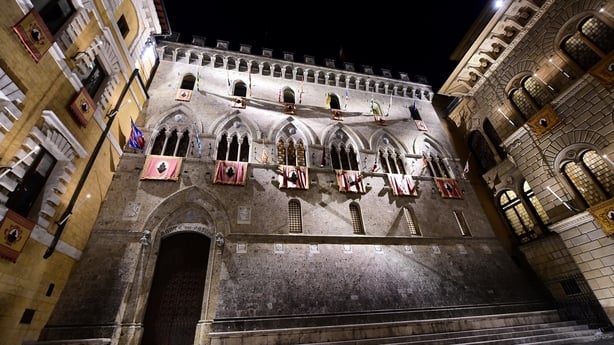The European Central Bank has rejected a request by Monte dei Paschi di Siena for more time to raise capital, a source has said, in a move that piles pressure on the Italian government to step in and rescue the ailing lender.
Italy had wanted more time to wrap up a €5 billion rescue plan that was thrown into doubt by the Prime Minister's defeat in a referendum at the weekend.
The ECB's supervisory board turned down the request at a meeting today on the grounds that a delay would be of little use and that it was time for Rome to step in, the source said.
The Italian government is expected to intervene to recapitalise the bank to avert the risk of it being wound down.
The failure of Monte dei Paschi could threaten the savings of thousands of retail investors, ripple across the wider banking sector and provoke a financial crisis in the euro zone's third-biggest economy.
Italy faces the risk of early elections, and the prospect of an anti-euro party coming to power, after Prime Minister Matteo Renzi quit this week following the heavy defeat of his plan to reform the constitution in a weekend referendum.
Analysis:

Rome and Brussels will have to get tough if they want to save Monte dei Paschi.
The Sienese lender has been a serial pest on the European regulatory scene for almost a decade.
Italy is devising increasingly quixotic attempts to prevent small investors in the bank from taking losses. Realism is needed.
Rome's problem is that the recent "no" vote in a national referendum on constitutional reform has upended plans to find €5 billion of private investment to plug MPS's capital hole.
Over half of the €3.3 billion of subordinated bonds outstanding, which are the ones that would be wiped out first, are held by retail investors.
This group could cause a political stink. Even if those were written down in full or swapped for shares, the bank would still need €700m of new cash.
Italy has tried a host of workarounds. Earlier this year it asked healthier domestic banks to pay into a fund called Atlas that would take stakes in weaker banks.
That merely undermined the system, and was in any case inadequately sized to tackle MPS.
Following the referendum, options include a loophole in European Union fine print that might let it suspend bail-in rules, or using €2 billion of state money to buy retail investors' bonds for cash.
European regulators might cave in. They could convince themselves that using public money to bail out a special interest group is okay if done at market prices.

